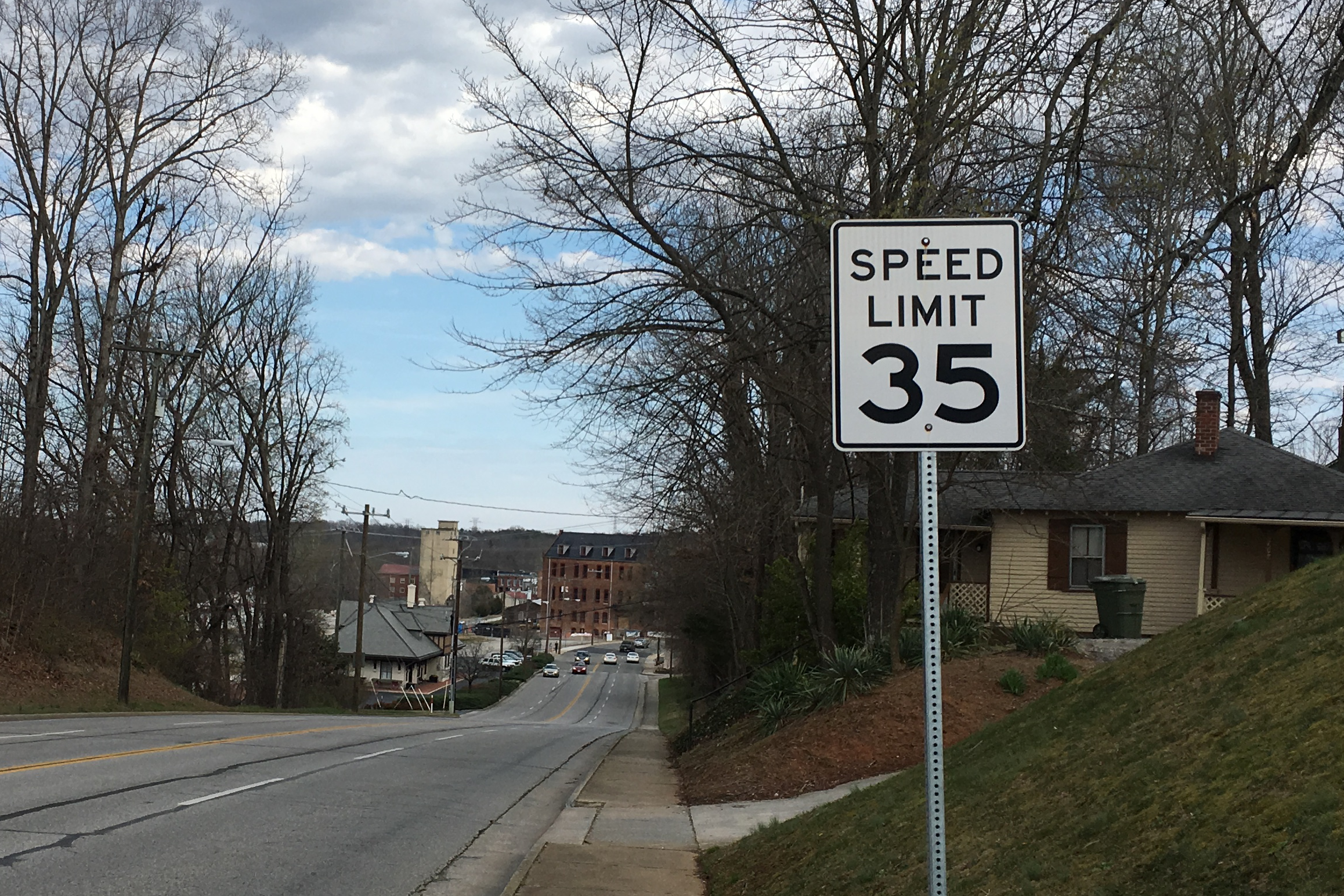
Pictured: A speed-limit sign on West Third Street in Farmville, Virginia, near the old train station. Speeding tickets can have far-ranging effects on your driver’s license and insurance premiums, even if you don’t live in Virginia. The speeding ticket lawyers at Hawthorne & Hawthorne can help.
Why Shouldn’t You Just Prepay Your Ticket?
Hiring a speeding ticket lawyer to fight your ticket might seem expensive, but prepaying your speeding ticket can be even more expensive. First, let’s consider the short-term consequences of prepaying a speeding ticket. A conviction for speeding in Virginia can lead to a range of punishments. If you were to prepay your ticket—in other words, plead guilty without actually going to court—you would generally pay a fine and court costs. The amount of the fine is calculated by how much you were speeding; the court costs are a flat fee set by each court.
Important Note: Driving 20 miles or more over the speed limit, or driving in excess of 80 miles per hour regardless of the speed limit, is deemed reckless driving (a criminal offense) in Virginia and is discussed on the “Reckless Driving” page of this site.
Now let’s consider the long-term consequences. Prepaying seems like a simple way to “get rid of” a speeding ticket, but there’s a catch: A conviction for speeding adds demerit points to your driving record, and your driving record is one of the factors that your insurance company will use to determine the amount of your auto insurance premium. This is true even if you don’t live in Virginia. What seems like a simple solution can end up costing you for years (literally).
Going to Driving School
What are your other options? If this is your first time receiving a speeding ticket, or if you haven’t received a speeding ticket in a long time, the court might allow you to attend driving school. Successful completion of driving school within the time specified by the court will result in the speeding ticket having a reduced impact, or maybe even no impact, on your driving record and your insurance premium. Please note that the court will decide on your court date whether or not you will be allowed to attend driving school for this purpose; the court typically will not give you credit for attending driving school before your court date.
A competent speeding ticket attorney can help you figure out whether or not you are eligible for driving school—please don’t just assume that you are (or that you aren’t). The information on this website is necessarily oversimplified and generalized because, candidly, different judges have different preferences. What works in one county might not work in another. While a website like this one can help you learn what your options are generally, nothing quite substitutes for the advice of an attorney who has experience in the specific court where your case will be heard.
Being Convicted of a Lesser Charge
If you are no longer eligible for driving school, it might be possible to obtain a conviction at a lower excess speed than was originally charged. For example, if you were charged with driving 67 mph in a 55-mph zone, it might be possible to obtain a conviction for going 64 mph, rather than 67. While the difference might seem small, it can result in fewer points being added to your driving record, which can affect how much your insurance premium will increase.
Having a properly qualified mechanic perform a calibration of your speedometer is one of the more common ways of having a speeding charge reduced. In other words, if your mechanic determines that your speedometer incorrectly showed you as driving more slowly than you actually were, the judge might take that into account when deciding your case. Obtaining a calibration must happen before your court date, unlike attending driving school. (The mechanic will give you a notarized affidavit that your attorney can then present to the judge on your court date.)
Even if a calibration is not helpful to your case, your attorney might be able to negotiate having your speeding charge reduced on the basis of other mitigating circumstances. Once again, don’t just assume that there are (or are not) mitigating circumstances in your case—an experienced speeding ticket lawyer will be able to help walk you through what might or might not qualify as a mitigating circumstance.
Fighting the Ticket
In still other cases, it might be wiser to defend against a conviction instead of pleading to a lesser charge. For example, the DMV will suspend your driver’s license for 90 days if you accumulate 18 demerit points in a 12-month period, or if you accumulate 24 demerit points in a 24-month period. If any conviction will place you beyond one of those point thresholds, it might be wiser for you to fight the ticket—to plead “not guilty”—instead of agreeing to be convicted of speeding at a reduced speed. Because the Commonwealth is not required to prove that you intended to speed, the available defenses are primarily technical and focus on the specific procedures that the police must follow to establish your guilt.
Let Our Experienced Speeding Ticket Lawyers Protect Your Record!
As was mentioned earlier, nothing quite substitutes for the professional advice of an attorney who has handled dozens or even hundreds of traffic citations in the specific court where your case will be heard. Our speeding ticket lawyers regularly defend clients like you in local courts throughout Southside Virginia, including the courts in Amelia County, Appomattox County, Buckingham County, Brunswick County, Campbell County, Charlotte County, Cumberland County, Dinwiddie County, Halifax County, Lunenburg County, Mecklenburg County, Nottoway County, and Prince Edward County. For a consultation concerning your speeding ticket in Southside Virginia, contact one of our experienced attorneys today!